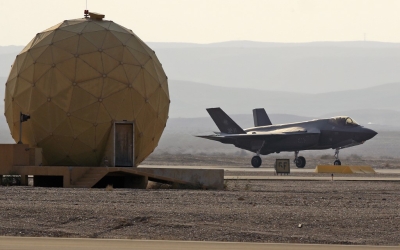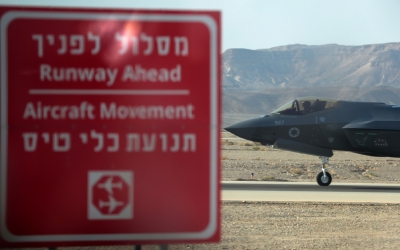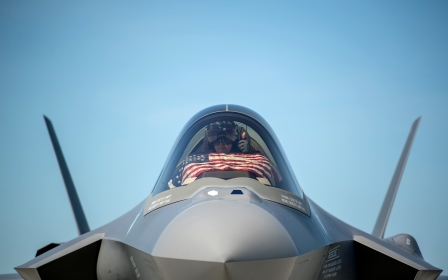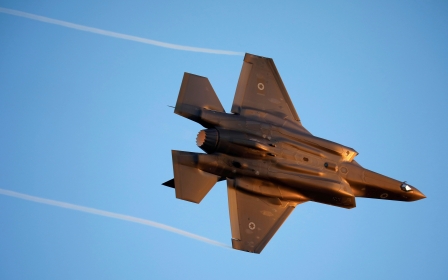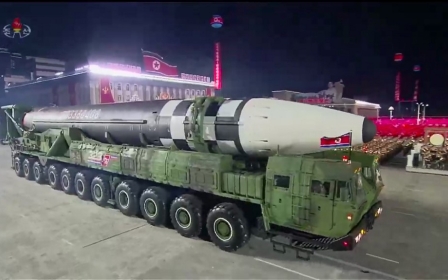US lawmakers to introduce bill that may allow Israel to buy bunker-buster bombs
Two bipartisan House lawmakers are set to introduce a bill this week that would require the US Department of Defence to consider selling Israel bunker-buster bombs capable of penetrating heavily fortified underground facilities.
The bill, aimed at giving Israel protection from perceived Iranian capabilities, would be the latest in a series of legislative moves aimed at guaranteeing Israel's qualitative military edge (QME) in the region.
New MEE newsletter: Jerusalem Dispatch
Sign up to get the latest insights and analysis on Israel-Palestine, alongside Turkey Unpacked and other MEE newsletters
"We must ensure our ally Israel is equipped and prepared to confront a full range of threats, including the threat of a nuclear-armed Iran," Congressman Josh Gottheimer, a Democrat, said in a press release on Tuesday.
"That's why I'm proud to be introducing this new bipartisan bill to defend Israel from Iran and Hezbollah and reinforce our historic ally's qualitative military edge in the region with 'bunker buster' munitions.
"Iran and its terrorist proxies throughout the region must never be able to threaten the US or Israel with a nuclear weapon."
Congressman Brian Mast, a Republican, is co-sponsoring the bill, which is set to be introduced this week.
Bunker-buster: largest of any non-nuclear bomb
The US Air Force currently stocks Massive Ordnance Penetrator (MOP) bunker-busters, a GPS precision-guided, 30,000-pound (14,000kg) bomb - the biggest non-nuclear bomb in the US arsenal.
The legislation would open the possibility of the US selling MOPs to Israel.
Testing for the MOP began more than a decade ago, amid concerns over perceived nuclear threats from North Korea and Iran, but it has never been used in combat.
Its predecessor, the Massive Ordnance Air Blast (MOAB) - with a fraction of its power and nicknamed the "Mother of all Bombs" - was first used against Islamic State group targets in Afghanistan on 13 April 2017 and has not been used since.
MOPs are said to be able to penetrate through 200ft of earth and 60ft of concrete before detonating to target underground nuclear facilities.
The weapon is a direct threat to underground facilities including Iran's Fordow complex - based inside a hollowed-out mountain - which the International Atomic Energy Agency (IAEA) confirmed last year was being used to restart uranium enrichment activities.
Under the 2015 multilateral nuclear deal, Iran was not supposed to enrich uranium at Fordow until 2030. But Tehran began walking back on its commitments in May 2019 in response to the US's withdrawal of the deal and reimposition of crippling sanctions.
Bill to block F-35 jet sale
In addition to Iran's nuclear advancements, lawmakers are also attempting to shield Israel against the Trump administration's efforts to sell F-35 fighter jets to the United Arab Emirates.
Last week, Democratic senators Bob Menendez and Dianne Feinstein introduced legislation aimed at restricting the sale, which they said would put Israel's military edge at risk.
The bill would require the White House to certify that Israel's military advantage in the region would not be jeopardised before the US starts selling its most advanced military aircraft to Middle Eastern countries.
A similar bill, which seeks to give Israel the authority over what qualifies as a qualitative edge, was introduced in the House weeks earlier.
It is important to note that a requirement to protect Israel's QME had already been established under US law with a bill passed in 2008, which stipulated that any proposed US arms sale to any country in the Middle East other than Israel must include a notification to Congress that guarantees the sale or export of such arms would not adversely affect Israel's military advantage.
Because of the QME restriction, F-35 sales have been denied to Arab states in the past, while Israel has acquired about 24 of the aircraft.
The UAE has long expressed interest in acquiring the stealth jets and had been promised a chance to buy them in a side deal made when they agreed to normalise relations with Israel in August.
Last month, sources told Reuters that the UAE and the US were aiming to have a letter of agreement in place for the F-35 deal by December.
Middle East Eye delivers independent and unrivalled coverage and analysis of the Middle East, North Africa and beyond. To learn more about republishing this content and the associated fees, please fill out this form. More about MEE can be found here.


